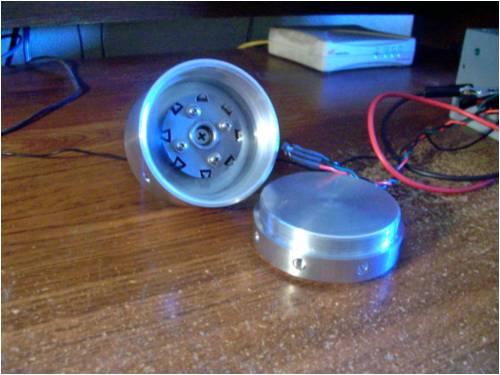
|

|
Forum Index : Electronics : Hall Effect for an Anemometer
| Author | Message | ||||
| pntrbl Newbie Joined: 12/07/2008 Location: United StatesPosts: 32 |
I'm building a hall-effect based anemometer and the hall-effect part of it is giving me some trouble. I don't have any experience with this particular form of black magic, but I thought all I had to do was place the hall in a magnetic environment and then pass a piece of ferrous material nearby. Not trusting those little electrons to respond to such a seemingly small amount of inducement, I glued an AH175 hall to a 1/4" x 1/2" long neo with an .020 airgap to an 8 pointed rotor I scrounged out a GM distributor. Man was that a disaster! LOL! Can you say cog? Besides that the neo had the flux so jammed around the hall I couldn't get it to shut off ..... Subsequent experiments on the bench have determined I need a .900 gap between that nasty little neo and the hall in order for it to be in a switchable state. At that distance the magic wand of any passing ferritic material does the trick very nicely. So I thought I was home free.... until I realized it's latching. Once I've waved the wand I can't get it to shut back off unless I pass another magnet nearby. The datasheet on the AH175 says it's useful for RPM detection, but if it latches at the 1st opportunity and stays that way I don't see how ... Obviously I don't know what I'm doing. If anyone can educate me and/or point me in the right direction I'll be eternally grateful. Thanx, SP |
||||
| Gizmo Admin Group Joined: 05/06/2004 Location: AustraliaPosts: 5078 |
I had a look on the net and it looks like the AH175 is a latching hall sensor ( same as those in the F&P motor ). This means if you pass a magnet by, it will latch on, and stay on, until you pass the magnets opposite pole by, to turn it off. This sounds like the result your getting. One way to fix this is to glue the magnet to the rotating shaft, so as the magnet rotates, the hall sensor is exposed to the S and N poles, latching on and off. But this means you only get 1 pulse per revolution. Do you still have the magnet pickup that came with that 8 pointed GM distributor plate. Its a magnet and coil combined together, and as the rotor passes by it generates a very peaky AC signal to drive the transistor assisted ignition. From memory its only a couple of volts AC, depending on RPM. You could use this signal instead of the hall sensor. Glenn The best time to plant a tree was twenty years ago, the second best time is right now. JAQ |
||||
| pntrbl Newbie Joined: 12/07/2008 Location: United StatesPosts: 32 |
Thank you for your response Gizmo. Alternating poles are in fact latching it up here on my bench when it's NOT in a magnetic field. The idea it had to be in a magnetic field is where I got started off on the wrong foot. I'm thinking the fix is gonna be to use the whole rotor out of the GM dizzy instead of just the eight pointed plate. It's a magnetic sandwich with fingers to alternate the poles around the edge which is a concept I just recently learned also! It's got the sharp pointed fingers I've been using on one side of a magnet, and long fingers to fill the gap between the points on the other. If it alternates poles at every gap it should pulse real well. I smell a junkyard run ...... 
Thanx again. To quote our Governor, "Ah'll be bahk". SP |
||||
| pntrbl Newbie Joined: 12/07/2008 Location: United StatesPosts: 32 |
I'm back with the full rotor and when I hold the hall in there close it works just fine. Pic. 
Still need to get the hall glued to a sliding pin that goes in the side so I can set and lock the gap. I'm thinking steel for the pin to draw any and all flux into the sensor, but I overthink this stuff all the time! 
Thanx for leading me along Gizmo ... SP |
||||